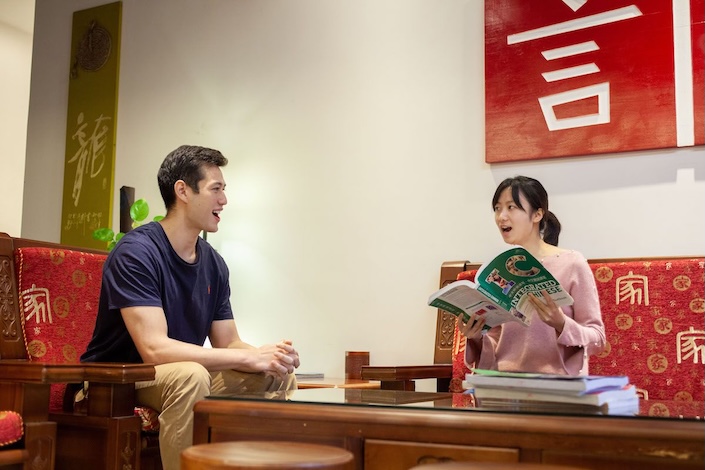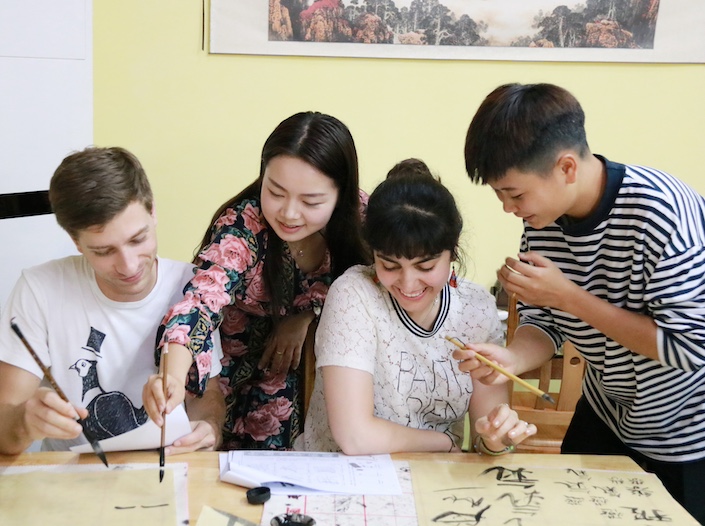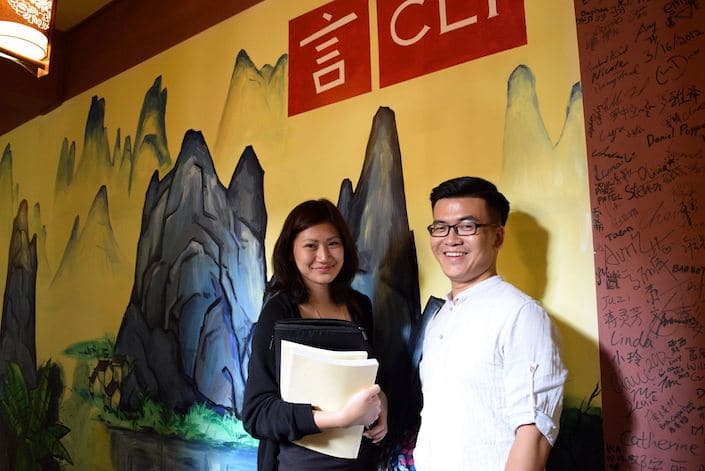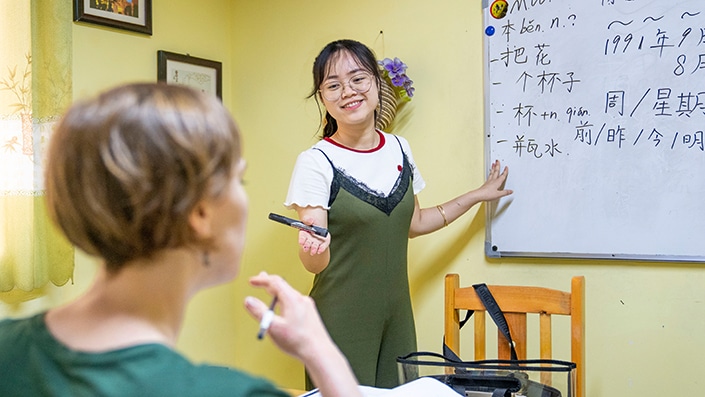What is the Chinese currency called?
 Anne Meredith
Anne MeredithLearn Chinese in China or on Zoom and gain fluency in Chinese!
Join CLI and learn Chinese with your personal team of Mandarin teachers online or in person at the CLI Center in Guilin, China.
China has the world’s second largest economy and Chinese money plays an increasingly important role in global financial transactions. That said, there's still a great deal of confusion when it comes to Chinese currency. Even the question of what to call Chinese money can be puzzling.
Read on to discover the different between Chinese renminbi (RMB) and yuan (CNY) and learn to talk about China’s currency in both English and Chinese.

Table of Contents
What is the name of the Chinese currency?
You may have heard Chinese currency referred to as “renminbi,” which is usually abbreviated as RMB. In Chinese, renminbi is written 人民币 (rénmínbì in pīnyīn), which means “the people’s money.”
Confusingly, however, it’s possible that you may also have heard Chinese money referred to as “yuan” (元 yuán), commonly abbreviated as CNY (“Chinese Yuan”).

The various different names used to refer to the Chinese currency can be confusing for the uninitiated.
RMB or CNY?
Why are there two names for Chinese money? Does China have two different currencies? What is the difference between RMB (renminbi) and CNY (Chinese yuan)?
There is, in fact, very little practical difference between the terms RMB (renminbi) and CNY (Chinese yuan), and you will often hear these two words used interchangeably. In every day vernacular, RMB and CNY are the exact same thing.
If you ask an economist, however, they will tell you that these terms are actually somewhat different. It comes down to the difference between currency and units of currency.
The word renminbi came into use the same year the People’s Republic of China was founded, in 1949. The word yuan, however, is much older, and was originally used to refer to the silver coins that European merchants used to trade with Chinese merchants almost 500 years ago.

In everyday usage, RMB and CNY are interchangeable. Technically, though, RMB is the name of the Chinese currency (like US Dollar), while CNY is a unit of that currency (like "bucks" or "dollars").
Today, renminbi is the general name for the Chinese currency, while yuan is the name of a unit of that currency. One way to understand this is to imagine a country that uses gold as its currency.
When telling someone how much something costs, you would be unlikely to say “This car costs 10 gold.” You need some sort of unit, such as ounces. Then you could say, “This car costs 10 ounces of gold.” In this example, gold is the currency, and ounce is the unit.
A commonly cited example of a similar situation is the difference between “sterling” and “pounds” in Great Britain. Instead of gold, England decided to use silver as its currency, and today, their currency is still referred to as “sterling.” Technically, you can’t say that something costs “15 sterling,” however. Instead, you should say that it costs “15 pounds sterling” or simply “15 pounds.”
In Chinese, then, it would technically be incorrect to say that my breakfast cost “15 renminbi.” Instead, I should say that it cost “15 yuan.”
How do people in China refer to their money?
If you find the difference between currency and units confusing, it might seem like a good idea to figure out which word for money is most popular in China and use that one.
Unfortunately, however, neither the word “yuan” nor the word “renminbi” is commonly used in China. Instead, most people in China refer to their money as “kuài” (块).
For example, if you go to buy a steamed dumpling for breakfast and ask how much it costs, the vendor might respond, “yī kuài” (一块), by which he or she means that it costs one yuan. Kuai is actually a Chinese measure word which is commonly used in many different contexts to mean “one piece.”
This is why you may also hear vendors in China say that something costs “yī kuài qián” (一块钱). Since “qián” means “money,” if translated literally, “一块钱” means that your steamed bun costs “one piece of money.”
Referring to yuan as “kuai” in China is similar to the way that Americans refer to US dollars as “bucks.”
一元 is “one yuan.” Why doesn’t my money say 一元?
Chinese paper money comes in denominations of one, five, ten, twenty, fifty and one hundred. If you have learned to write numbers in Chinese, you might be surprised when, upon examining your banknotes, you notice that while Arabic numerals such as 1 and 5 are prominently displayed, the corresponding Chinese numbers like 一 (yī) and 五 (wǔ) are nowhere to be found.
In addition, although you will see the word “yuan” written in Chinese pinyin, you won’t see the character for yuan (元) anywhere.
If you look closely at a 1 yuan banknote, however, you will see the characters 壹圆 (yī yuán) under the “1” in the middle to the left of Mao’s portrait. Although they look quite different, the characters 壹圆 (yī yuán) are actually the same as 一元 (yī yuán).
The character 圆 (yuán) is a variant of 元 (yuán) and the two share the same pronunciation. As for the 壹 (yī), it is just another, more complicated form of 一 (yī) that is used by bankers in China as an anti-fraud measure since it is harder to alter than the simple 一 (yī).

The other denominations of Chinese banknotes also replace the regular Chinese number characters with which you may be familiar with special fraud-resistant characters. You may also notice these more complicated ways of writing numbers on certain official receipts that you get in China.
Thankfully, the pronunciation of all these complex-looking fraud-proof number words is the same as the Chinese number words you may already have learned. Check out the table below to see how to write Chinese numbers like a banker:
| Number | Familiar Form | Complex Form | pīnyīn |
|---|---|---|---|
| 1 | 一 | 壹 | yī |
| 5 | 五 | 伍 | wǔ |
| 10 | 十 | 拾 | shí |
| 20 | 二十 | 贰拾 | èrshí |
| 50 | 五十 | 伍拾 | wǔshí |
| 100 | 一百 | 壹佰 | yībǎi |
Does China still accept cash?
Learning how to talk about and identify the numbers on China’s money is important, but if you have been following the news about the rise of mobile payments in China, you might wonder if it will even be necessary for you to use physical Chinese renminbi while in the country.
If you aren’t quite sure how to use Chinese mobile payment platforms, you’ll be pleased to know that China does still accept cash. However, it is important to recognize that although physical bills are still very much in circulation in China, mobile payment options such as WeChat Pay and Alipay are becoming more and more common.
It is even possible to spend an entire day paying for everything with a smartphone instead of cash. Even the owners of small vegetable stalls in traditional wet markets accept mobile payments.

Although it's still possible to pay with cash in China, mobile payment options enjoy growing popularity.
In fact, mobile payments have become so common that some merchants no longer keep enough small bills on hand to make change.
Sometimes if a customer tries to pay in cash but does not have the exact amount, shop owners and taxi drivers will say that they cannot make change and request that the customer pays using WeChat or Alipay instead.
If you plan to stay in China for an extended period of time, setting up a WeChat Pay or Alipay account will definitely make your life much easier.
If you only plan to stay in China for a short time, however, you should be able to withdraw cash at most Chinese ATMs using major credit cards such as Visa or Mastercard. In most cases, you will have to pay a small fee when withdrawing money using international cards.
How much cash should I bring to China?
If you are traveling to China for the first time, you might be wondering whether or not to bring any cash.
Legally, you are permitted to bring 20,000 CNY, 5,000 USD or the equivalent in other foreign currencies into China with you when you come. Since this number can sometimes change, be sure to check to make sure this is still the case before you travel.
Realistically, you will usually not need to bring much cash at all with you, however. USD is not accepted in China, so you are unlikely to need it during your trip.
There are currency exchange booths at most major airports in big cities, so you could bring a small amount of your own currency with you and exchange it at the airport when you arrive. Alternatively, you could exchange money in your home country before getting on the plane.

There are limits to the amount of cash travelers can bring into China.
Before you travel, it’s a good idea to familiarize yourself with the current exchange rates for Chinese renminbi and bring enough cash to cover the cost of a taxi from the airport to your hotel, as well as enough to cover a couple of nights at your hotel along with the hotel deposit.
Once you’ve arrived at your hotel and gotten settled in, you can then go out and withdraw more cash from an ATM.
Don't spend it all in one place!
Paying for things in a new currency in a new country can be exciting, but be sure you have a good idea of how much you're actually paying in your own currency equivalent before you spend.
The value of China's currency has continued to improve against the dollar in recent years and things in China are not as cheap as they once were!
Once you’ve got your renminbi in hand, be sure to take some time to examine it and think about its history, its future and all the different ways there are to refer to it in both English and Chinese.

Anne Meredith holds an MA in International Politics and Chinese Studies from the Johns Hopkins School of Advanced International Studies (SAIS). As part of the graduation requirements for the program, Anne wrote and defended a 70-page Master's thesis entirely in 汉字 (hànzì; Chinese characters). Anne lives in Shanghai, China and is fluent in Chinese.















